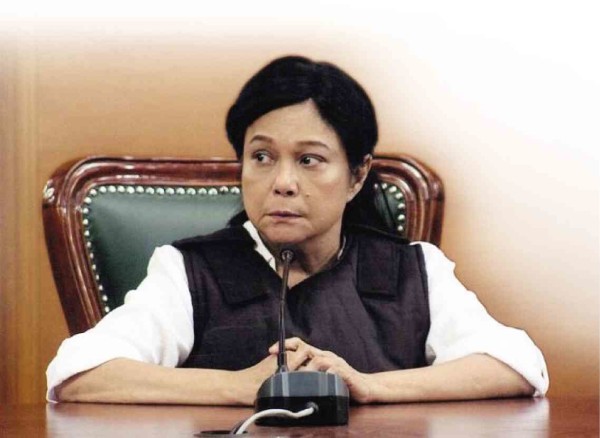Nora Aunor: Film is advocacy
Nora Aunor reveals a little-seen vulnerable side.
These days, she constantly worries about her youngest brother, former actor Eddie Villamayor, who suffered a stroke last year. She admits that she sometimes feels guilty because she can’t be with him as often as she wants.
“Minsan, kausap ko si Buboy [Eddie’s nickname],” she recalls in an exclusive interview with the Inquirer. “’Yung nararamdaman mo, ’yung sakit mo sa katawan, labanan mo. Tayong dalawa na lang ang natitira dito sa Pilipinas. Walang ibang magdadamayan kundi tayong dalawa. Kung susuko ka…sino na ang kakampi ko? Sino na ang magtatanggol sa akin? (I was talking to Buboy. I told him: ‘Stay strong in spite of the pain you’re feeling. Keep fighting. We are the only ones who can depend on each other. If you give up, who will remain by my side? Who will defend me?’)”
With pride, she tells Adolfo Alix Jr., the director of her latest film, “Whistleblower”: “Buboy is a good actor. A natural. I produced a movie for him, ‘Niño Valiente.’ He was in ‘Minsa’y Isang Gamu-gamo,’ too.”
Family is a topic that never fails to make Aunor’s famous eyes sparkle. When she heard about the heroic deed of her son Ian de Leon, she was filled with a mother’s joy. (De Leon brought a 10-year-old kid, who was run over by a motorcyclist, to the hospital.)
Even though they have little misunderstandings, she says she’s proud of her son. “Masaya ako. Magandang gesture ang ginawa niyang pagtulong. Saludo ako sa kanya! (I am happy. The help he gave to the child was a beautiful gesture. I salute him!)”
Film is another topic that she feels passionately about. Both as actress and producer, she has never shied away from making movies of substance and significance—works that tackled social issues, even at the height of the martial law regime in the 1970s.
With the relative freedom afforded by the indie film movement these days, she has found wider space to collaborate with young filmmakers and pursue various advocacies at the same time.
“Whisteblower,” Alix’s latest political thriller from Unitel and Quento Media, is right up her alley, she says. Half in jest, she admits she’s no expert when it comes to the film’s subject matter, the pork-barrel scandal. “I told Direk: ‘Kahit hindi ko naiintindihan masyado, sama ako diyan!’ (Even if I don’t totally understand it, count me in!)”
Suffice it to say that the pork-barrel scam is a story that all Filipinos should be aware of, she clarifies. “I’ve known about those controversies for a long time. Na ang pera ng mga mamamayan ay hindi napupunta sa tamang proyekto. Kasi nga, napupunta sa bulsa ng kung sinu-sino. (That the people’s money doesn’t go to the right projects, but to the pockets of some people.)”
It’s a lot like what happened after Supertyphoon “Yolanda” devastated Tacloban—a reality that she saw with her own eyes when she shot Brillante Ma. Mendoza’s “Taklub.” “’Yung mga donation, hindi napunta sa mga survivor ng bagyo (The donations didn’t go to the survivors),” she recounts. “’Yon ang pinakagrabe sa lahat. (That was the worst.)”
What our country needs, she insists, is “a leader whom people will follow—someone who is intelligent and not corrupt.”
She boldly wore a baseball cap that showed off her political colors (she supports Sen. Grace Poe) during the launch of “Whistleblower.”
When talk turns to a raging industry issue, she remains just as fierce, batting for safe and healthy working hours—a concern sparked by the passing of three directors in a month’s time.
“I have a cut-off time,” she points out. “I only work until 10 or 11 p.m. I also ask for a break between taping days. We all need to rest—especially those who are no longer as young.”
As a producer, she understands where the studios are coming from, as well. “Before I sign the contract, I ask for my cut-off time. If they agree, then good. No matter how great an actor you are, if you work from 7 a.m. to 2 a.m., your brain will eventually get tired.”
She recalls a specific incident when she arrived on the set at 7 a.m., but the cameras only started grinding at 4 p.m. “It was because the other stars had previous commitments. We had to wait for them.”
Such delays can be avoided, she notes, if the production is planned well. Like in “Whistleblower,” she relates, “Even though we have a big cast, we were able to finish the film without any problem. It’s all in the planning.”
